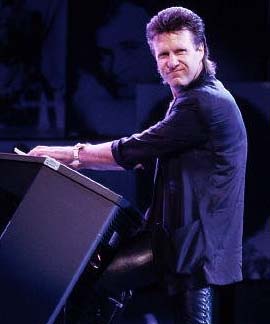By Shawn Perry
The image is unforgettable. There I was, sitting about 100 yards or more away, 14-years-old, my mind already blown by Black Sabbath and Deep Purple. The headliner of the California Jam was a band I knew only by name — Emerson, Lake and Palmer. For some reason, I confused them with Hamilton, Joe Frank & Reynolds, a soft-rock trio I had little interest in. But when ELP hit the stage, any and all comparisons fell by the wayside. My head was transported to another dimension by the handy keyboard work of Keith Emerson, the rich and vibrant vocals (with excellent bass and guitar accompaniment) of Greg Lake, and the mind-numbing, precision-guided drumming of Carl Palmer. This was it, I surmised, this was music the way it was supposed to be played. As if the playing wasn’t enough, I, like so many impressionable teenage boys, was also captivated by the visuals. Unlike Kiss though, these guys were master musicians who would incorporate their playing into the props. Well, at least that’s what Keith Emerson did when he strapped himself to a revolving piano and played an array of haunting notes for five minutes or so.
When it comes right down to it, Emerson is really what set ELP apart from the crowded arena floor of super groups. Having Greg Lake on vocals and Carl Palmer just made the whole thing that much more palatable. Lake surely held sway when it came to ELP’s commercial appeal, but Emerson broke new ground for the keyboards by taking a far more prominent role in the sound and formation of classic rock music. Unfortunately, I witnessed the tail-end of ELP’s majestic rise at the California Jam. After this gig, they virtually disappeared for three years. By that time, their days were numbered any way. A change in tastes and trends had turned ELP and their ilk into pariahs and targets of repugnance by the press, the punks, and the popsters. Internal strife and little potential to sustain the masses eventually split the group in 1979.
In the 80s, Keith Emerson made a little noise with a few inconspicuous soundtracks before teaming up with Lake and Cozy Powell for ELP Mach II. While it was short-lived, Emerson, as always, was at the top of his game and ready to take it further. He formed 3, a new spin on the power trio featuring Carl Palmer and virtually unknown American vocalist and bassist Robert Berry. Unfortunately, grunge made sure bands like 3 had no place on the rooster. The one and only 3 album is currently out of print.
No matter as the 90s spurred on the first wave of reunions by many groups, and ELP stepped up and belted one out of the park. While not quite up to the standards of old, 1992’s Black Moon and the tour behind it nevertheless resurrected the magical bond that sizzled amongst Keith Emerson, Greg Lake and Carl Palmer. But another six years of rigorous touring and little progress, coupled with the clash of egos and disagreements, ended the band for, what many speculate, good — depending on who you ask and how you ask it.
Keith Emerson hasn’t stopped working since ELP ended in 1998. He still dabbles with soundtrack work when it suits him. He’s made a couple of solo albums, and released a backlog of material and compilations to boot. He has his own band, has toured here and there, and is currently recording a new album of original music with guitarist Marc Bonilla as his foil. In the truest sense of the word, Emerson has a new lease of life, and is squeezing it for all it’s worth. And whatever happens in the future, on his own or back with ELP, is cool by him.
To read the rest of this interview, order your copy of
Conversations with the Masters:
The VintageRock.com Interviews




















